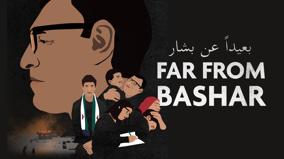Waiting for Raif
Filmed over a period of eight years, Waiting for Raif tells the tragic tale of a family torn apart by the Saudi monarchy’s intransigence, as it follows Ensaf Haidar’s inspiring battle to free her husband, prisoner of conscience Raif Badawi. The documentary offers a privileged and moving look at the personal and political implications of the affair, providing an inside view of the challenges faced by a young refugee mother of three, both in her adopted home of Quebec and on the global stage.

Details
Filmed over a period of eight years, Waiting for Raif tells the tragic tale of a family torn apart by the Saudi monarchy’s intransigence, as it follows Ensaf Haidar’s inspiring battle to free her husband, prisoner of conscience Raif Badawi. The documentary offers a privileged and moving look at the personal and political implications of the affair, providing an inside view of the challenges faced by a young refugee mother of three, both in her adopted home of Quebec and on the global stage.
-
producerLuc CôtéPatricio HenríquezColette Loumède
-
writerLuc CôtéPatricio Henríquez
-
directorLuc CôtéPatricio Henríquez
-
editingAndrea HenriquezClaude Langlois
-
participationEnsaf HaidarNajwa BadawiTirad (Doudi) BadawiMiriyam BadawiKatya ArbourCaroline CusteauSuzanne CayouetteMonia D'AmoursMireille ElchacarSandra HalléJane HospesSylvie JoubertYenny LópezRichard-Gilles Perreault
-
imagesFrançois BeaucheminJoël BertomeuLuc CôtéBruno FraserPatricio HenríquezÉtienne Roussy
-
location soundTiago McNicoll-Castro-LopesNils CaneeleLuc CôtéJulien FréchetteMélanie GauthierPatricio Henríquez
-
researchPascale BilodeauLuc CôtéPatricio HenríquezFriederike Venus
-
research - archivesNancy Marcotte
-
graphic designMélanie BouchardAlain Ostiguy
-
online editingYannick Carrier
-
colourizationYannick Carrier
-
original musicRobert Marcel Lepage
-
musical directionRobert Marcel Lepage
-
assistant musical directorOlivier BéliveauSamuel DesrosiersPierre-Yves MartelAndrew Wells-Oberegger
-
musicianOlivier BéliveauGuillaume BourqueSamuel DesrosiersSheila HanniganRené LussierPierre-Yves MartelMarilène Provencher LeducAndrew Wells-Oberegger
-
foleyStéphane Cadotte
-
foley recordingGeoffrey Mitchell
-
sound designClaude Langlois
-
re-recordingJean Paul Vialard
-
director, Informational DocumentariesJulia Lauzon
-
Senior Manager, Informational DocumentariesMarjolaine Mineau
-
additional imagesMarc AderghalTirad (Doudi) BadawiRafaël BarnwellRénald BellemareMaxime CôtéSylvestre GuidiChristian Paré
-
production assistantRaphaël FraserSarah-Ève Martin
-
editing assistantLea HenriquezVincent Lacombat
-
technical support - editingMarie-Josée GourdePierre DupontIsabelle PainchaudPatrick Trahan
-
translationMeriem Anchour BouakkzEli Jean TahchiJennifer HilleTrans & Sub Coop
-
subtitlingTrans & Sub Coop
-
interpreterMireille Elchacar
-
technical directorDenis Boisvert
-
production managerKoussay Hamzeh
-
administratorJohn ChretienSia Koukoulas
-
legal advisorDavid LangisLussier & Khouzam
-
marketing managerFrançois Jacques
-
marketing coordinatorÉmilie Ryan
-
studio coordinatorGabrielle DupontStéphanie Lazure
-
senior production coordinatorJoëlle LapointeChinda Phommarinh
-
technical coordinatorMira MailhotEsther Viragh
-
line producerMélanie Lasnier
-
executive producerColette LoumèdeNathalie CloutierLuc CôtéPatricio Henríquez











